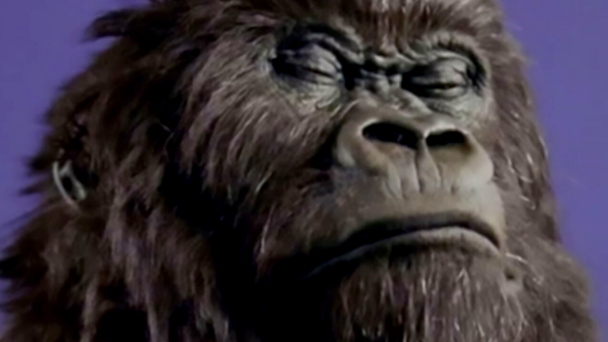When adland asks clients to be brave, we undermine our expertize and instincts
Brave work. Bold work. Brave work. Bold work. Dan Cullen-Shute’s tired of hearing these hackneyed terms. Adland is enriched with data, measurement, feedback loops, media channels and endless expertise – he thinks its time to stop talking like we’re taking risks or delivering ‘brave’ work...

Is Cadbury’s ‘Gorilla’ a true example of brave advertising?
I often think that, from the outside, advertising must sound like an incredibly exciting place to work. Not because it’s particularly progressive (it’s not, but we’re working in it), not because it’s particularly innovative (although it can be), but because every other article you read bangs on (and ON and ON) about the need for boldness and for bravery. And boldness and bravery, lest we forget, are very, *very* big words.
Sure. You have to make brave calls. Take big leaps. Write – and buy – bold work. If your professional life isn’t a constant battle against low-level professional anxiety that you grind into the ground in a staring contest, then you’re not really doing your job. And you’re certainly not doing it right. Like I say, brave and bold are big words: and between you and me, I’m not convinced we’re using them correctly.
Now, before you leap to assumptions, this isn’t a rant about how words have been devalued, and REAL bravery is being a soldier, or working in the NHS, or strolling through shot while Christian Bale’s acting his bloody socks off, because well, duh, that’s obvious, and it doesn’t need saying.
Context matters, and ‘bravery’ in the context of advertising and marketing can mean something totally different to what it means in the context of a war, or a global pandemic, or, well, working with Christian Bale. It’s language. It’s all good.
No, I’m talking specifically about how we currently use ‘brave’ in advertising, and how – because there was no way I was going to be able to write this whole thing without a nod to William Goldman and Wallace Shawn – while we may use it a lot, I’m not entirely sure it means what we think it means.
See, my suspicion is that it ‘used’ to mean something, back in the day when we had little more than a five-page document from the research nerds on the fifth floor (I can’t remember the exact Mad Men quote) to tell us about our audience. When we were making ads by smoking cigarettes, staring into the distance and muttering ‘down with equality, and that sort of thing.’ When we didn’t know who we were advertising to, what we wanted to tell them, why they’d care or whether anything we’d done before had had any kind of effect. The ‘good old days’ as people d’un certain age will tell you.
Back then, bravery meant going on instinct. It meant trusting your gut. It meant piling a ton of money into a concept that made you itchy, that wouldn’t let you sleep at night, that you just couldn’t walk away from. It meant trusting the creative agency to get it right, because they were also the media agency, and you’d already trusted them with all your money. And, more recently, to pick but one example, it meant sticking a big old gorilla behind a drum kit because you believed it would do something incredible for your brand, even if a couple of focus groups had told you that it definitely wouldn’t.
It meant doing the thing that felt right, when you had no way of knowing what ‘right’ was.
Lately, though, it feels like ‘being brave’ has come to mean something different. In fact, in a world where there are so many ways of testing your instincts (apologies, but if you’re looking for a rant about the inadequacies of research, you’ve come to the wrong column), ‘brave’ has started to mean the opposite. It’s started to mean doing something that feels wrong. And that just feels odd.
See, call me old-fashioned, but I don’t think it’s our job, as agencies, to persuade clients to buy something brave. I think it’s our job, as agencies, to demonstrate to clients, using all of the tools at our disposal, that what we’re proposing is right, and that buying the brilliant, exciting thing that’s right isn’t brave at all. It’s about demonstrating that it will resonate with the key audience, that it will drive the key behavior, and that it will work. It’s our job, as strategic and creative partners, to make our clients feel that what we’re proposing is so very right that not to buy it would be stupid: to get them to the point where buying what we’re selling isn’t remotely brave, no matter how different it is to what everyone else is doing, because it’s going to work.
And to stress, this isn’t about doing safe work, because I don’t think the opposite of ‘brave’ is ‘safe’. I think the opposite of ‘brave’ is confident. So no, don’t buy – or write – safe work. Pursue every brief with a degree of creative ferocity that will make the proposition squeak, and come up with something brilliant, and distinctive, and effective that works. But build that creative ferocity on a foundation of strategic excellence, and audience understanding, and behavioral science, and every other tool we have in our armory to ensure that what we’re doing is going to be brilliant, and is going to get the job done. And then show your clients why it’s not brave, but why it’s right. Why it’s brilliantly right.
When we call our work bold, we devalue what we do. We’re the journeyman midfielder who calls himself ‘unlucky’ when he twats it from 30 yards and it only just misses. When we ask clients to buy work that makes them uncomfortable, we neglect a fundamental part of our job, which is to take that discomfort and translate it into excitement – not least by showing that we’re as invested in the success of what we make as they are. And when we ask clients to be brave, we drastically undervalue our experience, our expertise, and, yes, on occasion our instincts.
Enough with being brave. Let’s get back to being confident, and to being right, and to making brilliant stuff that sells.
Dan Cullen-Shute is chief executive and founder of Creature of London. He tweets at @creature_dan.

